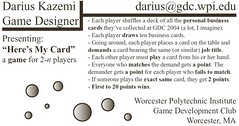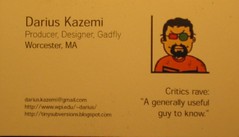Note: This is part of a series of articles called Effective Networking in the Games Industry. I’m writing these articles in no particular order, so I’m sorry if this seems scattered. I promise I will collect it all and put it on my permanent webspace for future reference.
Make Yourself Memorable
Networking is a pretty useless activity if the people you meet don’t remember you. Thus one of the major projects you should undertake is the creation of a persona. You need to be remembered for one thing in particular–actually, you’ll ideally be remembered for many things. I take a two-pronged approach to this, both in the business cards I hand out and in the physical impression I make.
Your Business Card
The business card is the personal currency of any industry. If you show up to an industry event and you don’t have a business card, you might as well be playing football without your helmet. Preparing food without your knife. Metaphor making without your imagination. Erm. You get the idea.
In my opinion, your business card needs to convey only a very small amount of information about you. All you need is:
- Name
- Title (if you don’t have one, be funny: “starving student” works pretty well)
- Company (if any)
- Contact (email, phone if applicable)
- Physical Location (I usually put City, State)
- URL (you do have a website, right?)
That’s really a pretty tiny amount of information to fit on a single business card, which in America is 2″ high by 3.5″ wide. This means that you have a lot of room to fit extra material on your card. You may be tempted to fill it with information. In 2004, I decided to make my card extremely information dense, resulting in this little guy:
A business card with the rules of a game that can be played entirely with business cards. Certainly memorable, although not as many people as you’d think actually remembered me for it. What really worked was my card from the next year, which I debuted at GDC2005.
The minimalist look of the card is striking relative to most of the business cards you see at GDC, which have gloss and tints that change with the light and embossing and all these other tricks. Although my approach is practically cluttered compared to the web-enabled business card.
For example, I gave my card to one XBox developer that I met on the first day of the conference. The next day, he came up to me and said, “Darius, thanks to your business card, I’m never going to forget you, ever.” I was flattered. But then two days later, I handed my card to a student from Carnegie Mellon who told me, “Hey, I’ve seen this card. I was talking to a guy from XBox and he showed it to me as an example of what my card should look like.” I’m pretty sure my card was a success.
It’s got three major things going for it.
- The tagline “Producer, Designer, Gadfly”. People remember gadfly, especially the ones who get the reference.
- The quote “A generally useful guy to know.” By the end of the conference, people I had just met were introducing me to their friends as “a generally useful guy to know.”
- The iconographic portrait. This is something I subconsciously stole from the guys at Harmonix. The portrait (made by artist Doug Chapel) sports my most memorable traits: glasses, beard, and an orange shirt.
Oh, I suppose I should explain the orange shirt, huh?
The Physical Impression
If you’re handing someone a business card, that means you’re meeting them in person. And you want them to be able to recognize you no matter where they might meet you in the future. I have my own take on this: I always, always, always wear an orange top. Be it a shirt, sweater, or jacket, it’s orange. Especially at an industry function. Every conference or IGDA meeting or interview, I’m wearing orange. It’s what I’m known for. As a bonus, I can put myself in an orange shirt on my business card and it will be accurate!
I’m not alone in this sort of tactic. Ernest Adams is rather famous for sporting a top hat at GDC. If you want to find him, people will tell you to look for the guy in the top hat.
Tricks like this get you known, especially if you’re consistent about them over a long period of time.


{ 18 comments }
I always thought it was better to have people forget you as quickly as possible. But I guess that’s just if you have a personality like mine, eh? ;)
I guess so.
Would it be a bad idea to put “wannabe” as one of the titles? I was thinking about putting this on my card but was unsure if it would be perceived as humorous or lame.
Jon: I’d lean towards not putting it on. The term has a connotation of “annoying person” to a lot of developers.
Good idea w/the repeating theme. I have a shirt w/a bands name on it “Scotty Don’t” all w/the red circle and line through it and random people that I have spoken to for like a sec. will remember me and my name from it. But to be fair, when I introduce myself and they see the shirt w/a puzzled look on their face, I say “It’s a reminder for myself!” and it always gets a laugh.
Another tip for your business card: never EVER put “Seeking any position in the game industry” on it. I’ve seen this multiple times at the GDC over the past few years, and I’m positive that it hasn’t led anyone to employment. Make sure people know you have a skill worth hiring.
Also, critique all the business cards you’ve collected for their effectiveness. Poor choices you’ve made with your own card may be far more obvious when taking an unbiased look at someone else’s card.
You should feel especially successful on this subject. By a pretty long shot, a friend of mine remembered you as “that orange shirt guy.”
I’m known at RIT for sporting a big black duster (most people call it a trench coat but it’s a duster) pretty much year round. Just that piece of personal information is probably enough to find me on the campus. I’m kind of thinking of using this as an identifier. Thoughts?
Yes, go with it. Everyone at RIT knows I’m referring to you when I say that kid with the black trench coat/mantle/cape looking thing.
I have a cool-looking indiana jones style of hat. Thinking of adding something like that to my business card, and trying to wear that to professional gatherings. (The only worry is whether it would look too informal or nerdy)
Heh, honestly it depends on whether or not you look good rocking a hat! I’m serious. The only way I could get away with orange all the time is that my complexion is dark enough to pull it off. Get someone you know who understands a thing or two about fashion to tell you if you look good in the hat or not. If you do… sure, go for it! But you don’t want your trademark to be silly or look stupid. Some people can rock an Indiana Jones hat, some can’t. Figure out which one you are :)
Thank you for the tips!! I am not a designer but I googled effective networking and your website popped up :)
My major is Statistics and people always tell me I am “brave or crazy for majoring in statistics”
Should I put this on the card? I do no want to call myself a statistician because I am not one, yet.
I don’t really know how things work in industries outside of video games. So I can’t really give you advice, other than your instinct is right: don’t call yourself a statistician until you have the credentials.
A distinctive look definitely helps. Particularly an eye-catching one as the population at GDC has swelled dramatically. My fluorescent yellow hair is distinctive AND my friends can spot me from the other side of the convention center, which means I actually get to meet up with almost all of them every time. :)
Hi Darius,
Your articles have been of great help to prepare myself for my first industry event. I have a question that I was convinced the answer was in one of your articles but I can’t find it…
As someone who is just starting out in the industry, is it a customary or polite thing to send these people a brief email to follow up on conversations or to thank them for their time and help as a way to be remembered and build ties? Some of these contacts were noobs like me, others were employees or owners of known and lesser known studios.
Also, would it be acceptable to mention connecting with these individuals on professional networking sites such as LinkedIn or is it too early?
What do you think would be the most appropriate behavior ?
Sending a brief (brief!) followup email is great. Just a simple thank you would suffice, or a short followup where maybe you provide a relevant link or something. (If it’s another noob, feel free to be lengthier with your email.)
Generally you can just go ahead and connect with them on LinkedIn.
As a scientist, I rarely see other scientists hand out business cards at conferences. Any thoughts on business cards in science?
It’s not my field, so I have no idea.
Comments on this entry are closed.
{ 4 trackbacks }